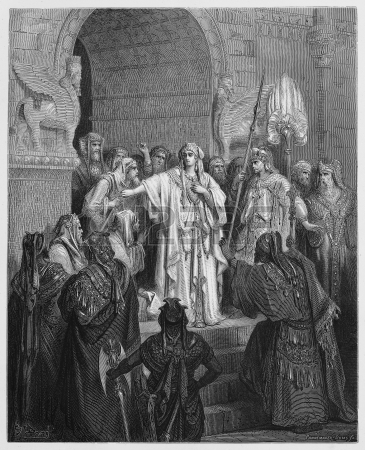Now it took place in the days of Ahasuerus, the Ahasuerus who reigned from India to
Ethiopa over 127 provinces, in those days as King Ahasuerus sat on his royal throne which was at the citadel in Susa, in the third year of his reign he gave a banquet for all his princes and attendants, the army officers of Persia and Media, the nobles and the princes of his provinces being in his presence… And he displayed the riches of his royal glory and the splendor of his great majesty for many days, 180 days. When these days were completed, the king gave a banquet lasting seven days for all the people who were present at the citadel in Susa, from the greatest to the least, in the court of the garden of the kings’ palace. …

Queen Vashti also gave a banquet for the women in the palace which belonged to King Ahasuerus. On the seventh day, when the heart of the king was merry with wine, he commanded Mehuman, Biztha, Harbona, Bigtha, Abagtha, Zethar and Carkas, the seven eunuchs who served in the presence of King Ahasuerus, to bring Queen Vashti before the king with her royal crown in order to display her beauty to the people and the princes, for she was beautiful. But Queen Vashti refused to come at the king’s command delivered by the eunuchs. Then the king became very angry and his wrath burned within him. (Esther 1:1-12)
Originally I was going to put Queen Vashti’s story with the stories of two other “evil” queens in the Old Testament. Vashti has generally been portrayed in a negative fashion and so my thought was to include her along with the other two “bad” queens, Jezebel (See post August, 2010) and Athalia (See post March, 2015).
Queen Vashti has been the poster woman for bad wives for many years. According to most sermons one hears, what happened to Vashti is a warning to all disobedient wives. After all, men have the right to expect their wives to obey no matter what.
So I was taught that Vashti was an arrogant, disobedient, ungrateful queen, but now I have studied the facts and I have a different opinion.
The bible says that King Ahasuerus wanted Queen Vashti to come into the court and display her beauty. At first, this doesn’t sound too bad.
However, historians tell us what went on at these Eastern banquets. The drunken friends of Ahasuerus were probably indulging in the pleasures of naked women for many days. The wine sodden Ahasuerus was insulting Queen Vashti by demanding that she appear, some say, wearing nothing but her crown.
Even if Vashti was not to appear naked in front of the king’s drunken friends there were other reasons for her to refuse.
- Queens usually appeared with the kings at festivals and sat beside them. However, if there was to be rioting and drinking, the queen was usually sent away and the king’s concubines participated instead. Perhaps Vashti refused to go to the king when his servants came to get her because the servants should have known that the queen was to be in seclusion while the orgy was going on. The queen did not have to lower herself to the position of the concubines or harlots at the banquet.
- Only the king had the right to gaze at his wife’s beauty. Vashti refused to debase herself by appearing in front of all the other drunken men. Though she knew she would anger the king, his command to her to appear offended her sense of propriety too much. Not only did the king’s demand lower her dignity as a queen, it was insulting to her as a modest woman.
Yes, wives are to obey their husbands generally. But wives do not need to obey if the husband  is commanding sinful activity that goes against God’s laws. Ahasuerus was demanding his virtuous queen to be sinful. Vashti was very courageous to refuse her drunken husband’s command. In this case her disobedience is to be praised!
is commanding sinful activity that goes against God’s laws. Ahasuerus was demanding his virtuous queen to be sinful. Vashti was very courageous to refuse her drunken husband’s command. In this case her disobedience is to be praised!
Vashti’s disobedience made the king very angry. His advisors came up with a plan that basically gave the king revenge on her. One of the king’s clever “yes-men” said to the king:
Queen Vashti has wronged not only the king but also all the princes and all the people who are in all the provinces of King Ahasuerus. For the queen’s conduct will become known to all the women causing them to look with contempt on their husbands by saying, “King Ahasuerus commanded Queen Vashti to be brought in to this presence, but she did not come.” This day the ladies of Persian and Media who have heard of the queen’s conduct will speak in the same way to all the king’s princes and there will be plenty of contempt and anger. (Esther 1:16-18)
This advice pleased the king of course. He acted immediately to protect husbands everywhere from disobedient wives. He sent letters throughout all of his provinces demanding that all women give honor to their husbands, great and small. This command is very humorous in light of the fact that Persian law already proclaimed that the husband was the master in his household. Husbandly rule in the household was already a well-established custom throughout the Eastern world.
Another aspect of this action that does not “ring true” is that immediately upon deposing Vashti, Ahahuerus was able to pick out another queen. The selection process for this queen would basically be a beauty contest. King Ahasuerus would test each and every virgin out in the royal bed. What a delightful solution for his dilemma.
That new queen of course would be Esther. I do not mean to take anything away from Esther’s obedience to her uncle and to God. She was faithful and God used her in His sovereign plan to rescue the Jews. Queen Vashti’s refusal to obey Ahasuerus was a part of God’s plan also. God used this situation to preserve His people while they were in exile for their own disobedience.
What can we learn from Queen Vashti? Should she be the poster child for disobedient wives? I don’t think so. Queen Vashti chose to risk the king’s anger rather than exhibit herself in a demeaning fashion and lose her modest dignity. Her own conscience was higher than the debauched demand of her husband. Along with her regal charm and beauty, her husband should have noticed that this woman was a woman of character. Ahasuerus sinned against Vashti. Queen Vashti had the courage of her convictions in the face of losing her position. She is to be admired for honoring the dignity of women’s modesty and for maintaining her self-respect.
Christian women today can follow Vashti’s example to honor the life that God has given them. Christian women can be careful about modesty and refuse to wear clothes that are immodest just because they are fashionable. Though women with high ideals may be ridiculed for their “old fashioned” values, women of courage who are after God’s heart will stand up to the ridicule and preserve God’s laws and their dignity.
We do not know if Vashti ever became a God-fearer, but her high idealism is an example for us even in this day of irresponsible moral values.

